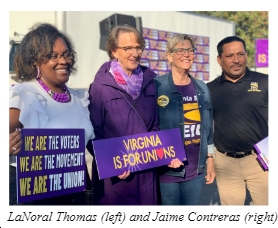 by Jaime Contreras, the Executive Vice President of 32BJ SEIU; and LaNoral Thomas, the President of SEIU Virginia 512. Together, they represent over 10,000 essential service workers throughout Virginia.
by Jaime Contreras, the Executive Vice President of 32BJ SEIU; and LaNoral Thomas, the President of SEIU Virginia 512. Together, they represent over 10,000 essential service workers throughout Virginia.
As a debate rages over the state of our nation’s economy, one thing remains constant whether it’s strong or weak – instability for Virginia’s frontline service workers who are subject to low wages, unsafe working conditions, and a disruption in employers. Right now, the Virginia General Assembly is debating commonsense fixes that would benefit these low-wage workers and the recipients of their services.
Janitors, security officers, and airport service workers are subject to a revolving door of employers, who are free to lay them off without cause or advance notice, while the replacement contractor is not required to retain the incumbent workers. This disruption in income can result in hunger and homelessness for workers who are often single mothers and the sole providers for their families.
In January 2023, 30 Alexandria city security officers lost their good jobs and benefits through no fault of their own when their employer changed hands at their worksite. The nonunion company that has now taken over can pay as little as minimum wage, with few if any benefits. Lower wages and benefits wouldn’t just hurt workers, but can mean lower standards for tenants and less money for workers to support local businesses and the community.
The Displaced Worker Protection Act simply allows local governments to pass their own displaced worker protections to ensure that experienced service workers aren’t arbitrarily replaced when a service contract changes hands. It establishes a 90-day transition period that gives workers the right to keep their jobs, which ensures higher standards that help workers, tenants and our economy alike.
Consider Kemi Adenariwo who works as a cabin cleaner at Dulles Airport, helping to maintain the hygiene standards that ensure passengers and crew can travel safely. Retaining experienced workers like Kemi is especially important to keeping workers and travelers healthy and safe from COVID and other transmittable illnesses.
Displaced worker protections have been a success in 20 locations across the country – including in Prince George’s County, Montgomery County, Baltimore and the District of Columbia. D.C.’s law has been in place for two decades, with little to no financial impact on the city. The law even enjoys support from D.C. contractors who say it allows them to compete on the quality of their services without hurting employees, many are the same ones who would be covered by the law in Virginia.
Throughout most of Virginia, home care workers – who help older adults and people with disabilities live with dignity and respect – earn just $13 per hour, without health care, retirement, and only five days of paid leave per year. This has resulted in high turnover rates, with families struggling to recruit and retain the care workers their loved ones need. The Care Crisis, as it is known, hurts families in need, care workers, and our entire economy.
Legislators can help address this crisis by raising reimbursement rates for frontline home care workers – using the savings that care workers generate by keeping their clients out of costly institutional settings. That’s why it’s in all of our best interests to see passage of a budget which raises the reimbursement rate for care workers, to ensure that working families can find the high standard of care support they need.
Consider Ebone Newton, a home care worker and mother of two from Norfolk, VA, who cares for a young man in his thirties who is on the autism spectrum and who has Crohn’s, pica, and seizures. Thanks to the care he receives, he can live an active and engaged life at home and in the community. Retaining dedicated care workers like Ebone is critical to addressing Virginia’s Care Crisis and ensuring that everyone can live with dignity.
Virginia’s economy is clearly in a strong enough position to help protect the men and women who helped make this possible. Passage of the Displaced Worker Protection Act, higher home care rates, and a $15 minimum wage for all Virginians is how we build an economy that works for working families, not just billionaires.


![Thursday News: “Europe draws red line on Greenland after a year of trying to pacify Trump”; “ICE Agent Kills Woman, DHS Tells Obvious, Insane Lies About It”; “Trump’s DOJ sued Virginia. Our attorney general surrendered”; “Political domino effect hits Alexandria as Sen. Ebbin [to resign] to join Spanberger administration”](https://bluevirginia.us/wp-content/uploads/2026/01/montage010826-238x178.jpg)








